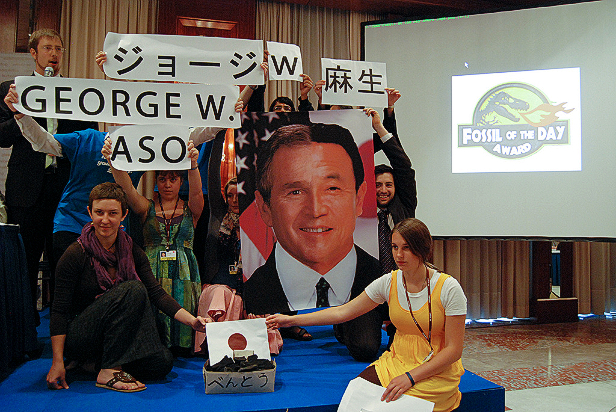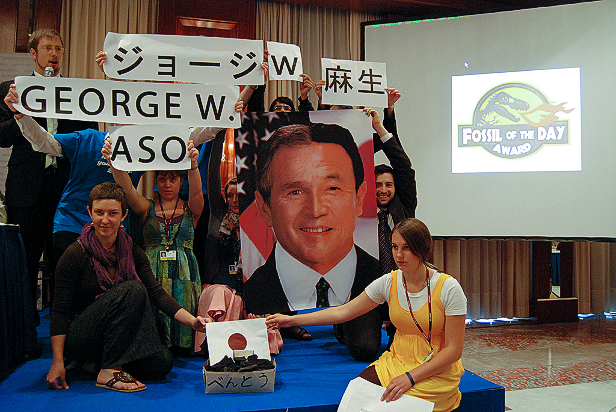 At the Bonn climate talks, environmental groups showed their displeasure with Japan’s proposed carbon emissions cuts by comparing Prime Minister Aso with former U.S. president George W. Bush.Climate Action Factory via Flickr
At the Bonn climate talks, environmental groups showed their displeasure with Japan’s proposed carbon emissions cuts by comparing Prime Minister Aso with former U.S. president George W. Bush.Climate Action Factory via Flickr
Even the skies wept last week when the latest cold front slammed into the ongoing effort to draft a new international climate treaty. The weather had been generally fine and sunny in Bonn during the early part of the two-week gathering, and participants in the talks had taken to sitting out on the terrace of the Maritim hotel and conference center to escape the atmosphere inside.
Then, towards the end of Wednesday morning, the rain fell, sending everyone scurrying indoors, washing out their abandoned coffee cups and stopping suddenly soggy bumblebees from getting airborne.
The cold shower on the terrace was matched by a figurative one inside, as news broke of Japan’s emissions target for 2020 — a declaration that makes it even harder for an effective agreement to get off the ground in time for December’s crucial climate conference in Copenhagen.
Japan’s prime minister, Taro Aso, announced what he claimed to be an “ambitious” pledge to cut emissions by 15 percent from 2005 levels. That might not have seemed too bad as an opening bid, except for the unfortunate fact that Japan’s emissions have risen significantly since 1990, the base year used for reductions under the Kyoto Protocol.
When measured by that yardstick, the target amounts to a cut of just eight percent. That’s only slightly higher than the target the country was supposed — but is comprehensively failing — to meet under Kyoto, a paltry bit of progress despite 12 years of steadily amassing evidence that climate change is happening much faster and much more seriously than anyone expected when the treaty was agreed to in 1997.
Asked for his reaction at a press conference, Yvo de Boer — who, as executive secretary of the UN Framework Convention on Climate Change, is in charge of the negotiations — paused dramatically. Then he spoke: “For the first time in two and a half years on this job”, he told us, “I don’t know what to say.”
Others were not so reticent. Climate campaigners rushed out a poster carrying a composite picture of the prime minister and the last U.S. president, emblazoned “George W. Aso.” Yu Qingtai, China’s climate envoy, said the target was not close “to what Japan needs to do,” while WWF said Japan’s target set “the wrong tone for the negotiations” and “makes reaching a good deal even harder.”
Indeed, this was just the worst example of a general failure by the world’s richest nations to come anywhere near the 25-40 percent cuts on 1990 levels demanded by scientists, which they themselves endorsed in principle just 18 months ago at end of a negotiating session in Bali. The Bonn talks, which ended on Friday, were supposed to finalize an “aggregate target” in this range for all of them.
No such aggregate target was agreed to. Worse, adding up all the individual goals so far announced by developed countries showed they so far amount to a cut in emissions of between 8 and 14 percent, which would give the world virtually no chance of keeping its temperature increase below two degrees centigrade, and thus avoid dangerous climate change.
And that was not the only failure in Bonn. Rich countries did even less on the crucial issue of providing money to help poor ones control their own emissions and adapt to the ill-effects of climate change. Not only did they fail to come up with a figure of what would be needed, but they did not produce any concrete suggestions on how the funds would be raised, managed or disbursed. (And, while the conference was going on, EU finance ministers for a second time postponed a decision on how much they would offer.)
Just about all that was achieved was to add some 200 pages to the 68-page negotiating text that was put on the table at the start of the meetings as countries attached their amendments to it. They will all now come back to Bonn in August to try to start whittling it down.
The atmosphere at the talks was friendly, but the United States, which had been warmly welcomed back into the fold at the last talks in March, began coming under heavy fire again. Karen Orenstein of Friends of the Earth US, said that after initially arousing “tremendous hope” worldwide, “the Obama administration’s position at these negotiations sounds frighteningly similar to that of George Bush.”
More generally, Shyam Saran, India’s special envoy, lamented: “There has been hardly any progress on achieving the key objective of our negotiations…which must be equal to the scale we face from global climate change.”
As Jennifer Morgan of E3G — a London-based group that works on sustainability issues — put it: “We have advanced perhaps a couple of miles towards Copenhagen. We still have thousands to go.”
Indeed. And there will doubtless be many more cold showers on the way.



